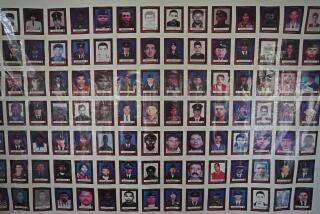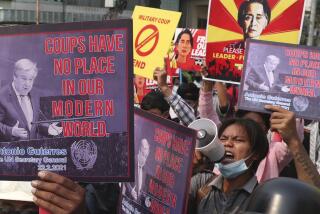Philippine Communist Army Shrinks; Attacks Intensify
- Share via
MANILA — Growth of the Philippines’ Communist rebel movement stalled this year, but the intensity of rebel attacks on military targets has increased dramatically, as has violent street crime in the nation’s capital, according to statistics made public Friday by senior military commanders.
In the first six months of 1987, the size of the Communist New People’s Army actually decreased by 5% from last year to 23,260 combatants, the first time in the history of the 18-year armed rebellion that the rebel force has declined, the military said.
1,891 Killed This Year
Military intelligence authorities explained the decrease by citing the 1,675 Communist combatants who have surrendered to the government so far this year, but the military conceded that only 179 of those turned themselves in with firearms.
In all, 1,891 people, more than half of them government troops and civilians, have been killed in the war so far this year, 70 fewer fatalities than occurred during the first seven months of 1986, the authorities said.
But they also said that 63 soldiers have been killed in land-mine incidents this year, compared with just one such casualty in 1986, and they stressed that the guerrillas are trying to bring their war to the capital city of Manila. They said that 19 soldiers and policemen have been killed by Communist assailants in Manila so far this year, the worst toll ever.
Adding to the worsening law-and-order situation in the capital, the authorities said, is a 24% increase in violent crime in 1987. They cited an outbreak of bank robberies and other armed robberies that they said could also be the work of the rebels.
Describing the military’s current offensive against the rebels as “a full-court press,” the armed forces chief of staff, Gen. Fidel V. Ramos, said at a Friday briefing where the statistics were released, that the 155,000-member armed forces “will now adopt a more aggressive stance” against the rebels.
Ramos also chided what he called “radical organizations” for exploiting President Corazon Aquino’s recently announced land reform policy in a bid to turn the nation’s masses against the government.
On Friday, members of one such organization, the Philippine Peasants Movement, marched more than 10 miles through Manila to a bridge near Aquino’s presidential palace, where 21 members of the same organization were gunned down by riot police and soldiers during an anti-government demonstration staged last January to demand comprehensive land reform legislation.
During Friday’s demonstration, protesters numbering fewer than 1,000 burned wooden effigies of Aquino, Uncle Sam, a landlord and a right-wing vigilante, who was pictured holding a machete in one hand and the severed head of a peasant in the other.
Jaime Tadeo, a longtime street activist and president of the 800,000-member peasant organization, said that Aquino’s land reform decree, ordering that most agricultural lands be offered for sale to the nation’s 2.5 million landless peasants, is merely a counterinsurgency gimmick.
“This is a dead law,” Tadeo said, as the effigies burned on the bridge. “It doesn’t have the heart and soul of a genuine law for social justice. Land reform laws were implemented in our country just in response to insurgency.”
Tadeo said the reason for the poor turnout at the protest was lack of funds. He said that his group had depleted its finances in its unsuccessful campaign for congressional seats in last May’s elections, but he vowed a larger showing during another protest planned for Monday, outside the suburban Manila building where the new Congress is scheduled to convene that day.
More to Read
Sign up for Essential California
The most important California stories and recommendations in your inbox every morning.
You may occasionally receive promotional content from the Los Angeles Times.












